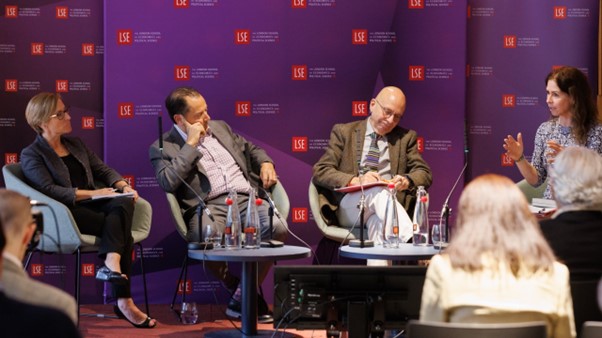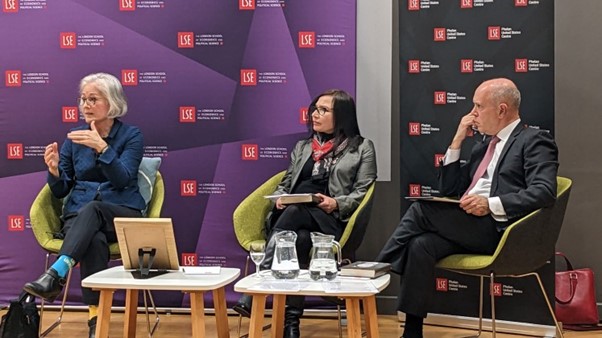 On Tuesday 7 May, the Phelan US Centre hosted the event “Made in China: When US-China interests converged to transform global trade” with Dr Elizabeth Ingleson (LSE Department of International History). Theodora Gaiganis gives an overview of the event and the Q&A segment.
On Tuesday 7 May, the Phelan US Centre hosted the event “Made in China: When US-China interests converged to transform global trade” with Dr Elizabeth Ingleson (LSE Department of International History). Theodora Gaiganis gives an overview of the event and the Q&A segment.
On Tuesday, 7 May 2024, the Phelan US Centre hosted the book launch event, “Made in China: When US-China interests converged to transform global trade” with Dr Elizabeth Ingleson, Assistant Professor in the LSE Department of International History and Phelan US Center Affiliate. The event, chaired by Phelan US Centre Director, Professor Peter Trubowitz, delved into the dynamics of China’s convergence on trade with the United States. The discussion offered a nuanced exploration of historical contexts, geopolitical shifts, and the intricate interplay between capitalism and diplomacy.
The talk began with a reflective anecdote, painting a vivid tableau of the covert 1971 encounter between Henry Kissinger and Chinese officials, a watershed moment that heralded the formalization of diplomatic ties between the United States and China. The sartorial irony of Kissinger sporting a shirt with the tag “Made in Taiwan” encapsulated the material manifestations of East Asia’s transformations and foreshadowed the seismic shifts that lay ahead.
During her remarks Dr Ingleson traced the contours of China’s transformative trajectory, casting a spotlight on the tumultuous late 1960s and early 1970s as the crucible of change. The unexpected fallout of the Cultural Revolution was an unlikely catalyst for policy reform, laying the groundwork for China’s integration into the global capitalist fold. Dr Ingleson’s analysis highlighted two often overlooked but crucial dynamics: the growing trade relationships that burgeoned amidst the turmoil of the 1970s and the recalibration of global capitalism, with China emerging as the keystone of a growing labor market.
The transformation of China, shifting from a Cold War outcast to a crucial strategic element, was a recurring theme, representing a multitude of cultural, diplomatic, and economic adjustments. The transition from the “Red China” moniker to the ubiquitous “Made in China” label underscored the nuanced evolution of China’s global identity, emblematic of its ascendancy on the world stage. At the heart of this narrative lay a tectonic shift in trade dynamics, epitomized by the US “company plan” aimed at amplifying imports from China. Dr Ingleson’s insights laid bare the underlying continuity in US trade frameworks, juxtaposed against the shifting sands of rhetoric. The “Made in China” label emerged as a potent symbol of globalization, a poignant reminder of the interplay between economic interdependence and nationalist enthusiasm.
The discussion concluded with a reflection on the imperatives of political vision in an era defined by flux. Against the backdrop of an inadvertent power shift from the US to China, the imperative for nuanced understanding and strategic foresight loomed large, underscoring the imperative of navigating the ever-shifting currents of global economic dynamics with acuity and agility.
The Q&A session offered deeper insights into the intricacies of US-China relations and the implications for global trade dynamics. Dr Ingleson, in response to a question about his personal interest in the topic, recounted her formative years growing up in Australia—a time when the US and China loomed large on the global stage. Motivated by a desire to unravel the enigma of their relationship, she began her research journey in 2012, a period marked by uncertainty in US-China relations. Her historical inquiry yielded poignant lessons, underscoring the perils of unchecked interdependence and the importance for a foreign policy framework that prioritizes the needs of US labor.
The discourse veered towards a retrospective examination of policy pathways and missed opportunities. Dr Ingleson outlined the concerted efforts of organized labor groups in the 1970s, spearheading legislative initiatives aimed at regulating offshore manufacturing. However, these endeavors were thwarted by entrenched resistance and fears of economic reprisals. The passage of the Trade Act of 1984, empowering the US President with greater autonomy in trade decision-making, was a pivotal juncture in US trade policy—a trajectory later echoed by the Trump administration.
A pivotal inflection point emerged as the dialogue shifted towards the shifting dynamics within China and the increasing US-pushback against Chinese imports. Dr Ingleson underscored the importance of recalibrating the narrative, recognizing China not as the problem per se, but as a manifestation of broader capitalist dynamics. The catalytic role played by Chinese Americans in facilitating this paradigm shift underscored the intricate tapestry of transnational influences shaping global trade dynamics.
Overall, the event offered a compelling journey into the intricacies of China’s convergence within the global economic landscape and its far-reaching ramifications for international trade. Dr Ingleson’s explanation of historical contexts, geopolitical shifts, and the interplay between capitalism and diplomacy provided a rich tapestry of insights, illuminating the nuanced evolution of US-China relations. From the anecdote of Kissinger’s 1971 encounter to the insightful analysis of trade dynamics, the discussion underscored the need for informed discourse and strategic foresight in navigating the complexities of the contemporary global order. As the dialogue continues, the role for policymakers, scholars, and stakeholders alike is in fostering a nuanced understanding of the ever-evolving dynamics, steering towards a future defined by cooperation, inclusivity, and mutual prosperity on the global stage. As Dr Ingleson put it, “we need to pinpoint where power resides in order to pinpoint what needs to change”.
Listen to a podcast interview with Dr Elizabeth Ingleson
- Listen to a recording of the event on LSE Player.
- Please read our comments policy before commenting.
- Note: This article gives the views of the author, and not the position of USAPP – American Politics and Policy, nor the London School of Economics.
- Shortened URL for this post: https://wp.me/p3I2YF-dTa






